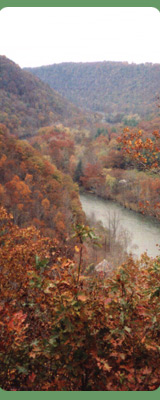
[Unused grafs from a writing project]
“Wild, Wonderful West Virginia”, the official travel bureau slogan reads. That’s been the state slogan for as long as I can remember, 35 years or so, so it must fit. West Virginia abounds in natural beauty, but it is truly a wild, gnarled beauty. The mountains that cover the state are not as majestic as the Rockies or even the Smoky Mountains of North Carolina and Tennessee, but more tangled and dense. The state is popular with extreme-sport enthusiasts, for the ski slopes, the turbulent whitewater, and the sheer cliffs.
The landscape is rugged, and so are the people. They’ve been hardened by a history that includes John Brown’s raid, the Hatfields and McCoys feud, the Matewan massacre, the Buffalo Creek flood, the Saco Mine collapse. Established in 1863, West Virginia is the only state that was actually founded during the Civil War, born of a rebellion within a rebellion. The state’s great folk hero is John Henry—who held a contest with a machine, and dies with his hammer in his hand.
A place can be wild and yet be far from pristine. There were once 10 million acres of virgin forest in West Virginia; now there are 263 acres. Every hill and hollow in the state is marked by humans. A lot of scenic vistas include a bridge or a railroad or an old coal pile. It’s not all postcard-perfect. West Virginia’s beauty and its violent history are not really separable. Life was always hard in West Virginia, even for the Shawnees before Europeans or Africans ever showed up. People contemplating earning a living in the area knew they were making a hard, perilous bargain. It is not easy to break that ground with a plow. It is risky and expensive to get at the timber and the coal.
Many enterprising souls over the years have come intending to make a score and then promptly leave. One of my great-grandfathers came and started a timber business, made a fortune, lost it, made and lost a couple more fortunes, and at the end of his life was bust. Three generations later, here we are. If one sticks around, he might get stuck. He might find himself hemmed in, without room to gun the engine and open up the throttle.
*
Among my family, the question whether to stay or to leave is constantly looming, at least in the background. My parents love West Virginia, yet they eventually felt they had to leave it, for wider horizons for themselves and their grade-school aged sons. That worked out fine—they lived the American dream and gave their children a good start in life, better than they themselves had had, objectively speaking. Yet we all wonder about the road not taken. As they close in on retirement, my parents toy with the thought of moving back home. And Mom and Dad made the cleanest break of anybody in the family. A couple of aunts and uncles left as young adults, but pretty soon moved back. Some cousins have only barely moved away, edging over the Virginia line.
The Hillbilly Highway definitely runs both ways. Every holiday weekend the roads south from Ohio and north from the Carolinas are jammed with traffic. I have escaped as far as North Carolina, but if as an undocumented immigrant I were required to “tag up,” I can make the drive back to West Virginian soil in less than four hours. I go back once or twice a year. The last time was on a rather bittersweet errand: to help my mother and my uncles close up my grandmother’s house after she moved into assisted living. The intimations of mortality cast shadows not just on me and my loved ones, but on the town where my grandmother lives. Someday I may be without an excuse to visit it.
